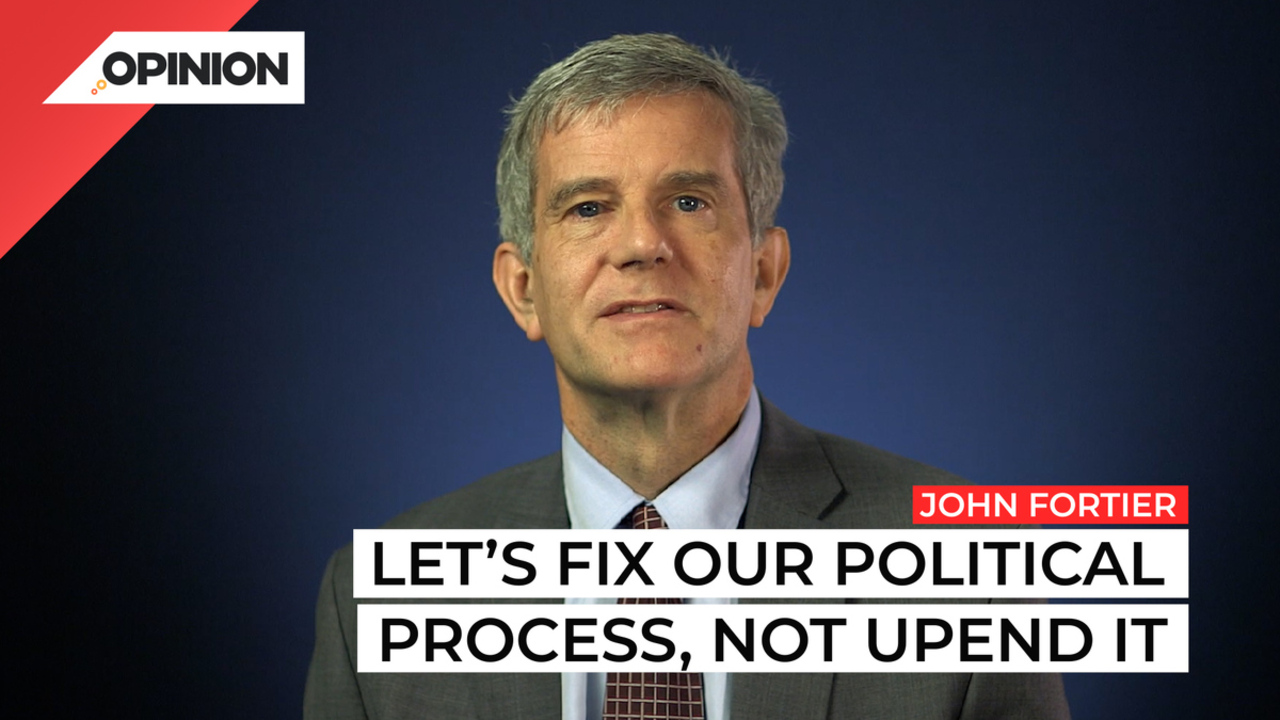Divided government—when one political party controls the White House and the other controls one or both houses of Congress—has appeared more frequently in recent decades. Before 1968, the government was unified more often than it was divided. Not surprisingly, there’s little consensus on whether divided government, like the one we have now, is a problem or a blessing for our country. On one hand, it keeps the majority party in check, and on the other, it can cause legislative gridlock. Straight Arrow News contributor John Fortier says we may need to fix our political process, but not upend it, as we head into budget and debt ceiling negotiations later this year.

Commentary
-
Our commentary partners will help you reach your own conclusions on complex topics.
It is sometimes not easy to see. But stepping back from the day-to-day controversies, America is in an extraordinary era of closely divided politics. We are a 50-50 nation. This close competitive competition between the two parties leads to many negative reactions, from frustration about the tone of politics and the inability to get things done, to more extreme criticisms, that our system is rotten to the core and needs fundamental change.
Today, I will cover three themes. First, how extraordinary our recent era is compared to past history. Second, some of the benefits of our competitive system. And third a focus on some of the more practical problems that closely divided politics leads to.
First, because we are in the middle of it, it is hard for us to see how unusual our politics is compared to the sweep of American history.
In the 28 years since 1994, Republicans have held the presidency for 12 years to Democrats’ 16. Republicans have controlled the Senate for 16 years to Democrats’ 12. The House is less equal. With Republicans holding the chamber for 20 years to Democrats’ eight. And in almost every election, parties believe that they can take control of the House, Senate or presidency.
We have had two 50-50 Senates and now we sit at 51-49. The current Republican House majority is narrow. And for 20 of the last 28 years, the minority party in the House has had at least 200 seats. In this current era, the largest popular vote margin of victory has been 8.5 percentage points. Compare that to 12 victories of more than 10 points in the 20th century.
Compare this to earlier eras. From 1930 to 1994, Democrats held the House of Representatives for 60 of the 64 years. The era prior to the New Deal era was a strongly Republican one, with Republicans winning 14 presidential elections to Democrats four.
Second. While it’s easy to lament the depth of civility and the dysfunction of our current politics, there are clearly some positives. In eras of one party dominance, it is possible that a large part of the population almost never sees their party in control of the presidency, House or Senate.
In our era, the defeats are often followed by victories. There is no permanent majority or minority. Almost all voters will see their party in charge of the key institutions of national government.
Also, our competitive era has seen the highest turnout in modern history. Our last five presidential elections have seen the highest turnout in over 50 years. 2020 was the highest with nearly two-thirds of eligible voters casting ballots. With close competition, there is a sense that every vote matters, and the voters feel a sense of urgency to cast their ballot.
Third, there is no doubt that the era of close competition has caused anxiety. Frustration with our politics, and even doubts about the efficacy of democratic government in general have risen.
This has led to calls for major reforms to our formal institutions and political parties. Should we have third or fourth parties, change our electoral system, or radically restructure our House and Senate?
Aside from these fundamental restructurings, I will highlight one key area where our closely divided politics makes governing more difficult. Divided government is extremely common in our closely competitive era. Presidents Clinton, George W. Bush, Obama, Trump and Biden have all had significant periods of divided government. In the past, while the dangers of divided government were lamented, research shows that Congress was actually quite productive in these periods. But today, divided government is more common, and the parties are more divided and combative in their aims. The prospects for significant legislation in a divided government has declined. The one area that the parties must find compromise on is in passing our annual spending bills to fund the government.
On these budget fights, we inevitably see conflict, delay and frequent deadlock for significant periods of time. We should not expect peace and harmony between the parties in these budget fights. But if we were to look to practical reforms, it would be better to focus on reforms that make this conflict-ridden part of our political process work better, rather than looking at more fundamental reforms that upend our politics.
More from John Fortier
-
Congress will not just play dead against Trump, DOGE
Less than one month into President Donald Trump’s second term in office, top officials, judges and legal experts are already warning that the returning president is causing a serious constitutional crisis. Specifically, they say that President Trump is usurping the powers of the legislative and judicial branches of government, effectively seeking to establish a new… -
Trump’s second term heralds changes for US social media
Elon Musk, the world’s richest man and owner of the social media platform X, contributed over $277 million to help President Donald Trump win the November 2024 elections. Mark Zuckerberg, owner of Meta, has also cozied up to the new president, contributing to his inauguration fund, resolving a legal dispute with Trump and announcing a… -
Musk-Ramaswamy DOGE initiative overdue and full of challenges
After winning the U.S. presidential election, Donald Trump announced his plans for a proposed presidential advisory commission he calls the Department of Government Efficiency (DOGE). Headed by Elon Musk and Vivek Ramaswamy, DOGE’s mission would be to trim government budgets, reduce regulations and shrink the federal workforce. Many Republicans view the initiative as overdue, while… -
This is the dawn of a new national Republican coalition
Republicans have won full control of both Congress and the White House. Donald Trump will return to Washington, D.C., as the first Republican president since 2004 to have won the national popular vote, ironically by almost the same margin that Hillary Clinton beat him by in 2016. These GOP victories relied on high pro-Trump voter… -
Why are transitions of power so complicated in the United States?
The American political tradition of a long and complicated transition of power, lasting from November to January, is an enigma in the world today, especially when compared to the many nations where transitions of power take place immediately or in less than 24 hours. Yet even after a new administration takes power in the United…
Latest Opinions
-
 Reuters
Reuters
Trump returns to CPAC, criticizes Biden and comments on Ukraine deal
-
 AP Images
AP Images
Trump’s Department of Justice removes database tracking police misconduct
-
 Getty Images
Getty Images
DOE to investigate Maine Education Department over trans athletes, Title IX
-
 Reuters
Reuters
New coronavirus discovered in bats similar to COVID-19
-
 AP Images
AP Images
Pope Francis in critical condition with asthma-like respiratory crisis
Popular Opinions
-
In addition to the facts, we believe it’s vital to hear perspectives from all sides of the political spectrum.






